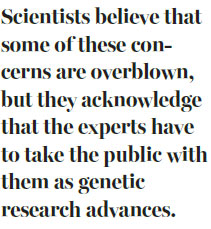Genetic advances put ethics in spotlight

Potential seen for huge medical breakthroughs, but some scientists argue global consensus needed to guard against possible abuse
In the latest world first for Chinese genetic scientists, a team at Guangzhou's Sun Yat-sen University have used cloned human embryos to correct an error in the human code that causes a potentially fatal blood disease.
The research further opens the way for genetic techniques that could eventually eradicate a range of inherited diseases. But, like all such advances in the field, it raises ethical questions.
There has been explosive growth in genetic research since the Human Genome Project announced in 2003 that a unique collaboration of scientists around the world had succeeded in mapping human DNA.
Most of the genome sequencing was conducted at universities and research centers in the United States, Britain, France, Germany, Japan and China, including the Institute of Genetics in Beijing.

In subsequent years, Chinese scientists have been at the forefront of advances in the field. Two years ago, scientists at Sun Yat-sen University announced that they had become the first to edit the genomes of human embryos obtained from local fertility clinics.
The pace of innovation has been so rapid that the general public, and indeed government policymakers, frequently struggle to keep up.
Incremental advances are sometimes misleadingly headlined as world-changing breakthroughs, while any research involving human embryos inevitably generates alarmist headlines about the dangers of tampering with nature.
At the root of such concerns is the fear, however ill-informed, that genetic techniques to tackle disease could herald a Frankenstein era of designed babies in which the rich and powerful can buy themselves superior offspring.
There are also legitimate worries that unintended negative alterations in DNA could be passed down to future generations.
Scientists believe that some of these concerns are overblown, but they acknowledge that the experts have to take the public with them as genetic research advances. They worry that popular misunderstanding of the nature of research involving embryos could lead to a backlash against all uses of genetic technology. That underlines the importance of highlighting medical ethics as research proceeds.
There are indications that informed debate is moving beyond the research lab and into the wider academic community. At the NEU Future Festival in Beijing in August, participants discussed the role of ethics in relation to such innovations as robotics and genetic engineering.
Currently in China, as elsewhere, scientists must seek permission from the ethics committee of their university or institution before engaging in embryo modification.
Given the pace of progress, different rules have emerged in different jurisdictions.

Scientists in the UK last year received the go-ahead to perform gene-editing on human embryos, subject to a 14-day time limit. Similar research is now legal in Sweden and the US but is outlawed in, for example, Australia, where scientists are pushing for a relaxation of the law.
China has a relatively liberal regulatory regime that has allowed its scientists to move to the forefront of genetic science. However, experiments are limited to nonviable embryos that could never develop; Chinese guidelines insist that trials must be geared to research, not reproduction.
Such guidelines are designed to guard against the unintended consequences of genetic research. They also address concerns that unscrupulous providers can abuse the public's incomplete understanding of advances in the human sciences to peddle fake cures.
In the related field of stem cell research, Chinese authorities announced a crackdown in 2015 on rogue clinics that were offering gene therapies that the clinics claimed would cure such diseases or disorders as epilepsy, cerebral palsy, cancer and autism.
Experimenting with the human genome offers huge potential benefits for future generations, including the eradication of what are now common diseases. The role of medical ethicists is to ensure that the public is protected in the process.
However, given the pace of progress, this challenge is largely being addressed on a piecemeal basis that varies from country to country. Some scientists argue that a global consensus is needed, because gene modification involves ethical, social and evolutionary considerations relevant to all humans alive today and those yet to come.
The author is a senior editorial consultant for China Daily. Contact the writer at harveymorris@gmail.com.
(China Daily European Weekly 10/06/2017 page11)
Today's Top News
- Germany vows to tackle people-trafficking to the UK
- Greek farmers fear fresh US tariff blow
- Global banks, institutions optimistic on China growth
- Chinese people's heroic victory praised
- Sichuan's ethnic festival attracts thousands of tourists
- Goal of high-tech self-reliance unchanged: China Daily editorial































